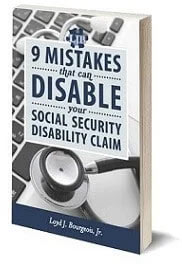Need Help With Your Social Security Claim? Get Help from a Disability Lawyer in New Orleans
Having a representative gives you a big advantage.
Having a lawyer knowledgeable in disability claims is invaluable.
From our law office, our LJBLegal team is your partner to guide you through this process.
You wanted to get back to work as quickly as possible after your illness or injury.
But as the weeks went by, that hope drifted further and further away, and now your doctor has said that you may not ever be able to perform your old job again. You have likely tried to get back to work in Mid-City a few times and came to the daunting realization that no matter how much you want to, you just can't.
You may not be able to walk, sleep through the night, or get through the day without severe pain!
And then your application for Social Security disability is DENIED.
You paid for your Social Security benefits with every paycheck, and now can’t get them when you need them!
You’re frustrated by the system and scared of the future, and you don’t know where to turn.
Above all, you can’t believe you’re expected to deal with a mountain of paperwork while you’re struggling just to make it through the day.
Do You Qualify for Disability Benefits?
This is one of the questions we get from people the most often. They just want to know if they qualify for SSDI benefits.
After helping hundreds of people across the country obtain disability benefits, we can get a good idea if you qualify by simply asking you a few simple questions.
Take our quick SSDI quiz, and we can tell you if we think you will qualify!
How Much Does a New Orleans Disability Lawyer Cost?
You may be wondering how you will ever pay a lawyer. In Social Security disability cases, we only get paid when we win benefits for our clients.
I only get paid if you get paid. There are no upfront, out-of-pocket costs to you.
We only get paid a portion of your back benefits if we win. In many cases, $7.200 is the maximum fee for a Social Security disability representative or attorney (if we win at the first hearing).
Call 985-240-9773 or fill out our online contact form to schedule your free, confidential consultation.
What is the Difference Between SSI and SSDI?
Both programs are overseen and/or managed by the Social Security Administration, and medical eligibility for both is also determined in the same manner.
However, that’s about as far as the commonalities go, as SSDI and SSI are two different governmental programs.
Social Security Disability Insurance (SSDI) is available to people who are medically eligible AND have a work history of paying into the Social Security program. There are no household asset or income limits.
Supplemental security income (SSI) is available to people who are medically eligible but do not have a sufficient work history. SSI is need-based and only available to those who fall under strict income and asset limits.
When Can I Apply for SSDI Benefits?
The surprising answer is – YOU DON’T NEED TO WAIT!!
You can file for social security disability benefits on the day that your doctor diagnoses you with a disability, or on the first day that you can no longer work because of your disability.
Do you need help from a New Orleans Social Security Disability lawyer to file your application?
How Long Do Disability Benefits Last?
You will receive Social Security Disability Benefits for as long as you remain disabled under the Social Security laws. However, if you remain disabled at the normal Social Security Retirement Age, you will be converted over to Retirement Benefits instead of SSDI.
How Do You Find a Good Social Security Disability Lawyer in New Orleans?
Here are some questions you might consider asking a disability representative before hiring them:
- If I am not happy with your firm the first 30 days after I hire you, can I discharge you as my attorney, take my case, and owe you nothing? The answer should be yes.
- Will your office be communicating with the Social Security Administration on my case? Yes, we will.
- Can you copy me on everything you do for my case? Yes.
- Have you ever been disciplined by the State Bar of Louisiana? No.
- Are you covered by a legal malpractice insurance policy? Yes.
- How much experience does your firm have in representing Social Security Disability clients? Take a look at our reviews on Google, Facebook, or Avvo.
- So, what do we have to prove to win my benefits? The representative should be able to describe this concisely to you!










